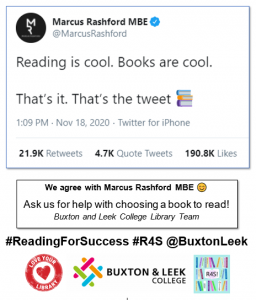This post has been written by Liz White, the Further Education Sector Representative for the ILG.
I have very little interest in, or knowledge of, football. I would find it tough to list as many current Premier League players as I have fingers, and perhaps only a few more retired footballers.
Despite this, I know a fair bit (as I am sure you do as well) about Manchester United and England forward Marcus Rashford. The 23 year old’s 2020 campaign to end UK food poverty has received widespread praise and encouraged action across the country to support struggling familes. Marcus has subsequently been rewarded with an MBE for this work.

Rashford was born in Manchester in 1997. His childhood experiences of poverty have clearly influenced his empathy for low income families. Clearly deserving of the position he holds within the world of football, he has not been shy about using this as a platform to instigate change. Effectively forcing the UK government to u-turn on its decision to end the free school meal voucher scheme last summer demonstrates this clearly.
So as an Academic Librarian supporting FE students, I was intrigued when I heard that Marcus was also launching a Book Club as part of a scheme to raise literacy among children, alongside publication of his own book ‘You Are A Champion’ set for May 2021.
This announcement, in November 2020, prompted me to ponder Rashford’s potential impact on reading habits of teenagers and young adults. His statement: “I only started reading at 17, and it completely changed my outlook and mentality” (Rashford, 2020) could potentially be instrumental in encouraging young people to follow his lead.
It is not a surprise that poverty and poor literacy levels are linked (Andrews, Robinson & Hutchinson, 2017; Douglas, 2020; Ellis & Rowe, 2020), nor that there might be an expectation that a celebrity endorsement may influence the target audience.
Marcus’s tweet declaring that “Reading is cool. Books are cool” (Rashford, 2020) has to date been retweeted over 27K times, and has more than 192K likes. At Buxton and Leek College we jumped on the bandwagon, creating some posters featuring the tweet, and we are using Marcus’s encouragement in promotions of our in-house reading challenge: Reading For Success. I’m sure that libraries across the country responded in similar vein!

Research by Nisbett and DeWalt (2016) suggests that there is a perception that young people can be influenced by celebrities on social topics, but that this depends very much on how much they respect that figure in the first place.
Celebrities expressing their opinions on relevant topics, however, can be successful in encouraging teenagers to discuss and explore those topics regardless of whether or not they are respected by them in the first place.
As a Librarian I can see the potential of Marcus Rashford’s influence, but am conscious that overload of the message could be equally as off-putting to young adults. Our Level 1 Information Literacy tutorial session on ‘Reading For Success’ includes quotes from celebrities about positive reading habits. The session encourages discussion about the skills that reading can help students to develop, including information literacy and critical thinking.
Despite positive feedback from students about this tutorial, a long term project to collect case studies of ‘reading role models’ from within vocational areas may be the key to encouraging a behaviour change. Bridging the gap between celebrity endorsement and the student with something that is arguably even more relatable: a successful individual in their chosen career area who can describe how reading, and development of associated skills, helped them to achieve their goals. Hopefully the ‘Marcus Rashford effect’ will support this work, providing a youthful household name to refer to as a strong supporter of young people improving their literacy skills for their own benefit.
I will be interested to hear from other college librarians about how they harness Marcus Rashford’s literacy campaign. I hope that this inspirational young man’s influence has a positive effect on reading behaviour, and ultimately information literacy, among young people across the country.
References:
Andrews, J., Robinson, D. and Hutchinson, J. (2017) Trends in Educational Attainment and Disadvantage. Available at: www.inspiringleaders-elearning.co.uk/portal/documents/npqsl/closing_the_gap_full_report_2017.pdf (Accessed: 16 February, 2021).
Douglas, J. (2020) ‘Marcus Rashford MBE is literacy’s player of the year’, National Literacy Trust. 24 November. Available at: https://literacytrust.org.uk/blog/marcus-rashford-mbe-is-literacys-player-of-the-year/ (Accessed: 16 February, 2021).
Ellis, S. and Rowe, A. (2020) ‘Literacy, social justice and inclusion: a large-scale design experiment to narrow the attainment gap linked to poverty’, Support for Learning, 35(4), pp. 418-439. DOI: 10.1111/1467-9604.12324.
Nisbett, G.S. and DeWalt, C.C. (2016) ‘Exploring the influence of celebrities in politics: A focus group study of young voters’, Atlantic Journal of Communication, 24:3, 144-156, DOI: 10.1080/15456870.2016.1184664
Rashford, M (2020) in ‘Marcus Rashford launches book club so every child can experience ‘escapism”, The Guardian, 17 November. Available at: www.theguardian.com/football/2020/nov/17/marcus-rashford-launches-book-club-so-every-child-can-experience-escapism. (Accessed: 9 February, 2021).
Rashford, M. (2020) [Twitter] 18 November. Available at: https://twitter.com/MarcusRashford/status/1329049202169700353 (Accessed: 9 February 2021).



